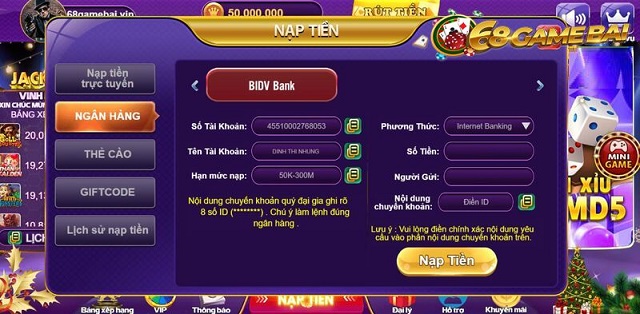
68 game bài





Đăng ký 68 game bài nhận 68k trải nghiệm cực chất
Khuyến mãi cập nhật tháng 4/2024
- 68 game bài khuyến mãi tân thủ 50k đối với người chơi đăng ký mới và chỉ cần liên kết số điện thoại và tài khoản ngân hàng
- Ngoài khuyến mãi khi chơi bản web và ứng dụng di động, thì 68 game bài còn có thêm ưu đãi nạp lần đầu tặng thêm 20%, nạp lần 2 tặng thêm 10% (yêu cầu hoàn thành 3 vòng cược mới được rút tiền, không áp dụng cho các sảnh cược thể thao, xổ số, và sảnh livestream)
- Tập đoàn Solair group kính chúc quý khách an khang thịnh vượng, vạn sự như ý!
Lưu ý
- Chúng tôi khuyến khích quý khách liên kết số điện thoại với tài khoản game bài 68 để tránh mất tài khoản
- Trong trường hợp phát hiện hội viên có hành vi gian lận thì 68gamebai có quyền tạm khóa tài khoản.
Thị trường cá cược trực tuyến hiện nay ngày càng sôi động với sự xuất hiện của nhiều cổng game đổi thưởng chất lượng. Vì thế, bạn có thể dễ dàng chọn được cho mình sân chơi lý tưởng để đặt cược giải trí, kiếm tiền. Hôm nay, bài viết sẽ giới thiệu đến bạn thương hiệu 68 Game Bài đình đám. Hãy khám phá cổng game này nhé!
Tổng quan về 68 Game Bài

68 Game Bài là một cổng game đổi thưởng xanh chín được nhiều người yêu thích và lựa chọn trải nghiệm. Cổng game này còn được biết đến với các tên gọi khác như Game Bài 68, 68gamebai,…Tuy nhiên nhìn chung, cổng game chính là một sản phẩm của tập đoàn Solaire. Mọi hoạt động của cổng game cam kết hợp pháp khi được tổ chức PAGCOR cấp phép.
Đặc biệt, cổng game này được đầu tư mạnh mẽ trên nhiều phương diện như giao diện, kho game, hệ thống bảo mật,…Vì thế kể từ khi ra mắt đến nay, 68 Game Bài liên tục gây sốt trên thị trường. Cổng game nhanh chóng thu về nhiều giải thưởng do các tổ chức cờ bạc hàng đầu thế giới bầu chọn. Số lượng khách chơi đăng ký cổng game cũng gia tăng mạnh mẽ.
Như ghi nhận, tính đến nay Game Bài 68 đã có mặt trên 100 quốc gia khác nhau. Riêng tại Việt Nam, cổng game đang nhận được nhiều đánh giá tích cực. Mặc dù xuất hiện chưa lâu nhưng cổng đã trở thành thiên đường giải trí cá cược xanh chín được khách chơi tin tưởng, lựa chọn.
Ưu điểm của 68 Game Bài
68 Game Bài được anh em cược thủ và các chuyên gia đánh giá rất cao khi hội tụ nhiều ưu điểm. Trong đó, những ưu điểm nổi bật nhất của cổng game có thể kể đến như sau:
Uy tín, đáng tin cậy
68 Game Bài hội tụ đầy đủ các yếu tố để trở thành một trong những cổng game xanh chín, chất lượng hàng đầu. Trong đó, yếu tố số 1 chính là sự uy tín của cổng game.
Cụ thể, hệ thống máy chủ của Game Bài 68 hiện nay được đặt ở nước ngoài. Mọi hoạt động giải trí, cá cược do cổng game cung cấp đều hợp pháp khi được tổ chức PAGCOR cấp phép. Bên cạnh đó, cổng game còn được quản lý và vận hành bởi tập đoàn Solaire. Vì thế, chỉ cần đến với cổng game, người chơi sẽ được trải nghiệm trong môi trường công bằng, minh bạch, rõ ràng. Tuyệt đối không xảy ra trường hợp cổng game lừa đảo, gian lận người chơi.

Bảo mật tuyệt đối
68 Game Bài cũng gây ấn tượng với hệ thống an ninh, bảo mật chất lượng. Hầu như mọi thông tin của người chơi sẽ được hệ thống cổng game mã hóa, lưu trữ bằng các công nghệ hàng đầu. Ví dụ như công nghệ mã hóa SSL, MD5, hệ thống tường lửa,…
Đặc biệt, cổng game tuân thủ mọi quy định bảo mật thông tin trong ngành giải trí cá cược trực tuyến. Cổng game cam kết không buôn bán hay tiết lộ thông tin của người chơi cho bên thứ 3. Đồng thời, tôn trọng tối đa quyền riêng tư của người chơi.
Vậy nên, người chơi trải nghiệm game đổi thưởng tại Game Bài 68 sẽ được bảo mật tuyệt đối. Người chơi chỉ cần tuân thủ quy định của cổng game sẽ được cam kết an toàn. Các vấn đề đáng lo ngại khi chơi game đổi thưởng online như bị bắt, bị lộ danh tính,…sẽ không xảy ra với người chơi.
Kho game đặc sắc
Kho trò chơi được đánh giá là một ưu điểm vượt trội của 68 Game Bài. Tại đây, người chơi sẽ được trực tiếp chơi game đổi thưởng hấp dẫn với rất nhiều tựa game khác nhau. Ví dụ như:
- Game bài Tiến Lên Miền Nam
- Game bài Phỏm
- Game Rồng Hổ
- Game Tài Xỉu
- Game Gold Country
- Game nổ hũ Tây Du Ký
- …

Trò chơi hấp dẫn tại cổng gameNhìn chung có đến hàng chục, hàng trăm nghìn tựa game chất lượng quy tụ tại cổng game. Đặc biệt, mỗi tựa game đều là sản phẩm được cung cấp bởi các nhà phát hành hàng đầu. Vì thế, trải nghiệm game đổi thưởng tại Game Bài 68 cho phép người chơi thỏa sức lựa chọn. Chắc chắn, cổng game sẽ mang đến cho người chơi phút giây giải trí, đổi thưởng hấp dẫn nhất.
Giao diện đẹp mắt, thân thiện
68 Game Bài ra mắt thị trường với mục tiêu trở thành thiên đường giải trí số 1 Châu Á. Vì thế, cổng game được đầu tư giao diện xịn sò để mang đến trải nghiệm tốt nhất cho người chơi.
Như ghi nhận, giao diện Game Bài 68 mang phong cách hoàng gia đẹp mắt. Khi truy cập cổng game, người chơi sẽ bị thu hút ngay bởi ánh nhìn đầu tiên. Chưa kể, giao diện cổng game còn được thiết kế thân thiện. Tổng thể bố cục sắp xếp khoa học, logic. Kết hợp thêm ngôn ngữ hỗ trợ đa dạng. Điều này cho phép người chơi dễ dàng thao tác trải nghiệm hay tìm kiếm thông tin trên cổng game.
Hơn nữa, Game Bài 68 cũng được thiết kế tối ưu nên tương thích nhiều thiết bị. Cổng game hỗ trợ người chơi truy cập trải nghiệm các trò chơi mượt mà trên PC lẫn điện thoại. Vì thế đến với cổng game người chơi sẽ không cần lo ngại vấn đề chơi game đổi thưởng bị lag, giật khó chịu.
Thanh toán nhanh chóng
Cổng game mang đến sự an tâm cho người chơi khi cung cấp dịch vụ thanh toán chuyên nghiệp. Theo đó, người chơi tại Game Bài 68 sẽ được hỗ trợ giao dịch nhanh chóng. Hầu như mọi giao dịch nạp rút của người chơi đều được hệ thống cổng game xử lý trong thời gian từ 5 đến 10 phút. Nếu giao dịch lần đầu thời gian có thể lâu hơn một chút.

Đặc biệt, hiện nay Game Bài 68 còn cung cấp nhiều kênh thanh toán. Ví dụ như qua ngân hàng, qua ví điện tử, thẻ cào,…Vì thế, người chơi có thể linh hoạt lựa chọn phương thức giao dịch phù hợp để tiến hành.
Khuyến mãi hấp dẫn
Những ưu điểm của 68 Game Bài không thể nào bỏ qua hoạt động khuyến mãi. Bởi vì, thực tế cổng game này là một trong những sân chơi đổi thưởng có ưu đãi hấp dẫn nhất trên thị trường cá cược. Chỉ cần người chơi lựa chọn đến với cổng game sẽ được tham gia săn thưởng mỗi ngày. Không phân biệt người chơi mới đăng ký tài khoản hay thành viên lâu năm. Ví dụ như:
- Khuyến mãi nạp đầu lên tới 8888000 đồng
- Điểm cược mỗi ngày nhận thưởng tối đa 1000000 đồng
- Khuyến mãi tích điểm trưởng thành
- …
Tất cả chương trình khuyến mãi sẽ được cổng game thông báo đến thành viên người chơi. Ngoài ra, mỗi người chơi cũng có thể chủ động cập nhật khuyến mãi trên trang chủ cổng game. Mọi quy định, điều kiện của chương trình khuyến mãi sẽ được cổng game nêu rõ giúp người chơi dễ dàng nắm bắt để tham gia nhận thưởng.
CSKH tận tâm, nhiệt tình
68 Game Bài cũng là sân chơi đổi thưởng có sự đầu tư về dịch vụ CSKH. Mục đích của cổng game là hỗ trợ người chơi tối đa. Vì thế, cổng game đã mang đến dịch vụ CSKH chuyên nghiệp, chất lượng.

Một khi lựa chọn cổng game, người chơi sẽ luôn được tư vấn miễn phí. Đội ngũ nhân viên CSKH cổng game đông đảo, làm việc 24/7 sẽ lắng nghe mọi băn khoăn của người chơi. Từ đó, nhanh chóng xử lý và tư vấn nhiệt tình giúp người chơi an tâm trải nghiệm.
Đặc biệt, 68 Game Bài hiện nay đang triển khai đa dạng kênh CSKH. Ví dụ như chat live, Hotline, gmail,…Vậy nên, người chơi có thể liên hệ đội ngũ nhân viên CSKH cổng game bất cứ khi nào cần hỗ trợ.
Kho game hấp dẫn tại 68 Game Bài
68 Game Bài mang đến kho trò chơi đặc sắc. Vì thế, kể cả những người chơi khó tính cũng có thể hài lòng khi trải nghiệm tại cổng game. Vậy thực tế có gì chơi tại cổng game? Dưới đây là các sản phẩm trò chơi hấp dẫn được tổng hợp cho bạn tham khảo:
Game đánh bài
Game bài là một trong những sản phẩm trò chơi Hot nhất tại cổng game. Hầu như mỗi ngày đều có lượng khách chơi lớn truy cập cổng game đánh bài đổi thưởng. Đặc biệt, 68 Game Bài cũng không khiến người chơi thất vọng khi mang đến rất nhiều tựa game đỏ đen nổi tiếng. Người chơi đến với cổng game có thể trải nghiệm đầy đủ các loại game bài từ truyền thống đến hiện đại.
Game điện tử
Nếu người chơi yêu thích các tựa game điện tử thì đến với Game Bài 68 cũng là lựa chọn lý tưởng. Bởi vì, hiện nay cổng game đang cung cấp rất nhiều tựa game điện tử hấp dẫn, mới lạ. Bao gồm như:
Game quay hũ
Game quay hũ, slot từ lâu đã được anh em cược thủ đam mê trải nghiệm. Đặc biệt, mọi nhà cái và cổng game đổi thưởng hiện nay hầu như đều cung cấp sản phẩm trò chơi ăn khách này. Dĩ nhiên 68 Game Bài cũng không ngoại lệ.
Vậy nên, người chơi đến với Game Bài 68 có thể truy cập không gian trò chơi quay hũ đặc sắc để trải nghiệm. Tại đây quy tụ rất nhiều tựa game quay hũ hấp dẫn, nổi tiếng cho phép người chơi lựa chọn theo sở thích.

Ngoài ra, Game Bài 68 còn cung cấp thêm nhiều trò chơi gây nghiện khác nữa. Người chơi chỉ cần truy cập cổng game sẽ được bước vào thiên đường giải trí đúng nghĩa.
Kết luận
Qua góc thông tin bạn có thể thấy 68 Game Bài sở hữu nhiều ưu điểm ấn tượng. Cổng game xứng danh là sân chơi đổi thưởng xanh chín nhất trên thị trường hiện nay. Vậy bạn còn chờ gì mà không trở thành thành viên cổng game để được trải nghiệm những điều tốt nhất. Chắc chắn, Game Bài 68 sẽ không khiến bạn thất vọng. Tuy nhiên với tư cách khách chơi, bạn đừng quên tìm hiểu kỹ lưỡng các quy định, điều khoản, điều kiện của cổng game.


 Tài Xỉu
Tài Xỉu Tiến Lên
Tiến Lên Baccarat
Baccarat Xóc Đĩa
Xóc Đĩa Poker
Poker Bầu Cua
Bầu Cua